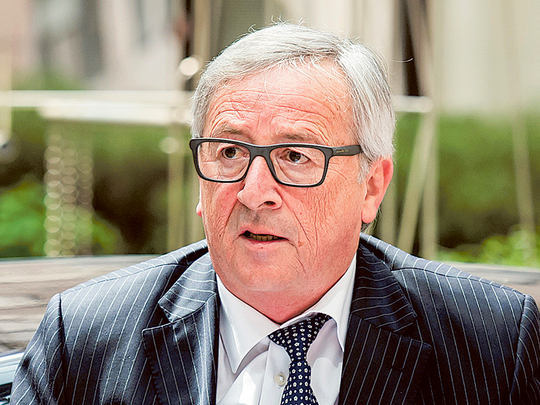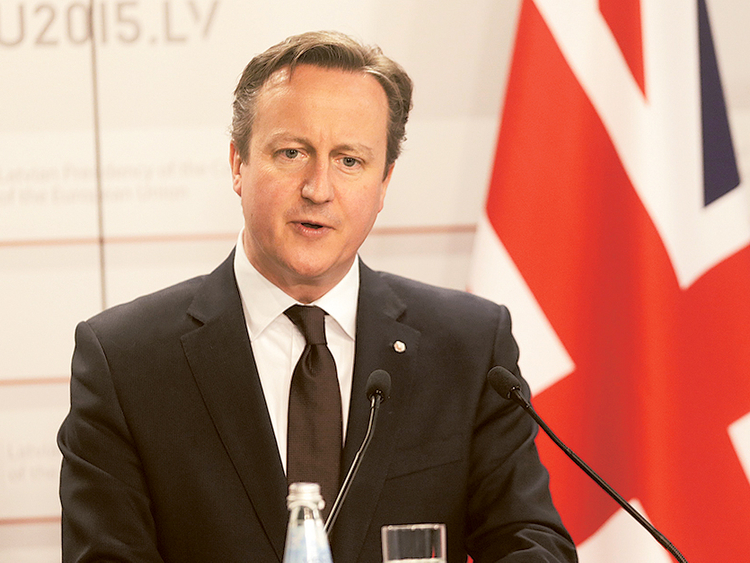
London: The British government’s new legislative programme, including a referendum bill on leaving the EU, will be announced by Queen Elizabeth on Wednesday as parliament gets down to business after the Conservatives’ election win.
The mood of Westminster’s grandest day is likely to be sunny as the queen comes to parliament in full ceremonial regalia and Prime Minister David Cameron’s party basks in this month’s surprise outright win over Labour, who are now hunting for a new leader.
But the to-do list for his centre-right government also includes controversial issues such as powers for Scotland and human rights reform, which could signal trouble ahead as he bids to pass laws with a slim majority.
Cameron, whose policies critics say often favour the wealthy, said this was a “one nation” government whose first Queen’s Speech would help Britons in “every city, every community and every home.”
“This time it’s [about] renewal — renewing the idea that we are one nation, in which all working people can succeed; people of all backgrounds have social justice; and the ties that bind all parts of our nation are strong,” he wrote in this week’s Sunday Times.
The bill paving the way for a referendum on whether Britain should remain a member of the European Union, due to be held by the end of 2017, will be published the day after the speech.
Cameron has signalled a referendum could be held as soon as 2016, and is embarking on a whistle-stop tour of European capitals this week for talks on the reforms he is seeking on issues like immigration before the vote.
After hosting European Commission head Jean-Claude Juncker at his country residence, Chequers, on Monday, before travelling to meet the leaders of Denmark, the Netherlands and France on Thursday, and then Poland and Germany Friday.
He aims to talk to other leaders of the 28-member EU individually before a European Council summit at the end of next month.
The Queen’s Speech will also feature new legislation handing new powers to Scotland after it voted against independence in a referendum last year.
Nicola Sturgeon’s pro-independence Scottish National Party (SNP), which became the third largest group in the Commons following the election, wants the government to go further.
The SNP, which increased its number of MPs ninefold at the election, says Scotland should get more powers over taxation to bring it in line with regions like Quebec in Canada.
Cameron’s government could also face a rebellion from both opposition parties and within its own ranks over its plans to scrap European human rights laws.
This week’s Sunday Telegraph quoted an unnamed member of the government as saying he could resign over the issue, and former justice minister Damian Green warning withdrawal would “damage our country’s reputation.”
In the Queen’s Speech, the 89-year-old monarch sits in the House of Lords with a crown on her head to give an address written for her by what she calls “my government” outlining the laws it plans to pass.
Before she starts speaking, Black Rod, a parliamentary official, walks from the House of Lords to the House of Commons to summon MPs to hear her address.
The doors of the Commons are slammed in his face, symbolising its independence from the monarchy in a tradition dating back to the 17th century. MPs then follow Black Rod back to the Lords and the speech begins.
Afterwards, parliament debates its contents for five or six days before voting on it.
This is effectively a confidence vote in the government — one it should win given that the Conservatives have a Commons majority, albeit a small one.
The party’s majority is effectively around 15 seats, but the precise size has yet to be defined pending the election of deputy speakers, who do not vote.













